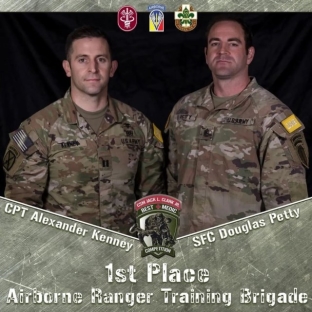
Capt. Alexander Kenney, PA, and Sgt. 1st Class Douglas Petty of the 6th Ranger Training Battalion, Airborne Ranger Training Brigade
FORT POLK, LA — Anyone with a 68W military occupation specialty signs up to go above and beyond the call of duty as a matter of course. As combat medic specialists, they provide life-saving treatment in the chaos and trauma of battle and accept responsibility for the health and well-being of their fellow soldiers on base.
Each year, the Army seeks to identify which of those combat medic specialists go beyond even that high standard in a three-day test of personal strength and endurance and medical knowledge known as the Command Sgt. Maj. Jack Clark Army Best Medic Competition.
This year’s winning team—Capt. Alexander Kenney, PA, and Sgt. 1st Class Douglas Petty of the 6th Ranger Training Battalion, Airborne Ranger Training Brigade—beat out many worthy challengers in a competition at Fort Polk, La. Designed to simulate a medic’s operational environment, the competition includes the Army Combat Fitness Test; an extrication exercise; casualty hoist operations; tactical combat casualty care; prolonged field care; care for casualties in a chemical, biological, radiological and nuclear event; and a written exam.
Other components tested skills, strength and endurance through a ruck march, an obstacle course completed while carrying a simulated patient, a helocast, M4 rifle qualification, stress shoots, day and night land navigation, health services and support, and a mystery event. In multiple simulated crises, the competition challenges medics to deliver life-saving medical interventions in extreme environments.
Just earning entry to the event demonstrates determination, skill and a desire for constant improvement as all participants much have received either the Expert Field Medical Badge or the Combat Medical Badge. As an indicator of the level of challenge posed by these qualifications, the Expert Field Medical Badge (EFMB) has a pass rate of less than 20%.
Kenney and Petty encouraged any medic interested in the competition to make sure they are physically ready, and then don’t be deterred from going up against the “best of the best.” More specifically, Kenney urged medics who wanted to prepare for the challenge “to put some miles on your legs, running ruck as much as you can and remember the basics.”
Petty expounded on that advice. “Master the 10 level tasks medically. Everyone wants to do more advanced medicine, but if you can’t master the 10 level tasks, you’re never going to get the chance to do that more advanced medicine.”
Both Petty and Kenney have enjoyed the coaching role that winning the competition put them in. “It has just been inspirational to see people want to better themselves,” said Petty. “And then they look to you for that mentorship. Like, he is now the Army Best Medic. What can we learn from him and really take away from him to better ourselves.”
“It’s been good to inspire a bunch of young medics,” added Petty, who is now the battalion senior medic and medic platoon sergeant. “After coming back from winning, I’ve had 10 medics go to EFMB and eight of them want to compete in the Army Best Medic Competition.”
“It’s been great being able to give back to the community and talk to some of the younger guys coming up … and guide them along the same path,” said Kenney, who served as a combat medic and is now the battalion’s physician assistant. “It’s been a good opportunity.” Like many physician assistants in the military, Kenney was previously enlisted and sees the value of teaching younger soldiers about military medicine and possibly motivating them to pursue a career in the field.
Both men delivered care in combat deployments in Iraq and Afghanistan after undergoing some of the most rigorous training in the Army.
The 6th Ranger Training Battalion “is the most dangerous, the most high-risk battalion in the United States Army,” Petty said. “Maintaining health and welfare is a huge portion of that, and understanding what each one is going through — which is why we’re all Ranger tabbed as well — we’ve all been through the program. So knowing what their issues are, and knowing what their struggles are, are super helpful in being able to deliver effective care and anticipate what their challenges are going to be medically.”
For Kenney, work as a medic required constant integrity and dedication to continuous learning. “It’s a no-fail mission, so you have to be dedicated to what you do,” he said. “And the integrity piece of it is not only doing the right thing 100% of the time, but having the self-check, self-awareness, the integrity to take it up every day. Learn something new and be better than you were yesterday, because medicine is a lifelong learning experience.”

